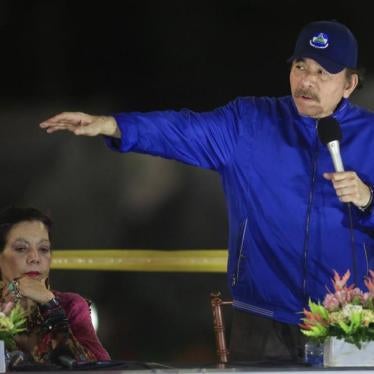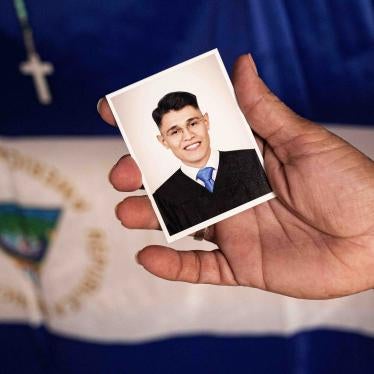Washington DC, November 28, 2021
Ambassador Josué Fiallo
Dominican Republic Permanent Representative to the Organization of American States
Chair of the OAS Permanent Council
Re: The Human Rights Situation in Nicaragua
Dear Ambassador Fiallo,
I am writing in advance of the Organization of American States (OAS) Permanent Council meeting to evaluate the situation in Nicaragua scheduled for November 29, to share with you the findings of recent reports by Human Rights Watch on the grave human rights crisis and the dismantling of the rule of law we have documented. I respectfully urge OAS member states to consider applying Article 21 of the Inter-American Democratic Charter, through which Nicaragua could be suspended from the OAS by a two-thirds majority vote. I also urge you to share this document with the Permanent Council’s member states.
The OAS has been closely monitoring and denouncing the escalation of repression in Nicaragua in the run-up to the November 7, 2021 elections. On June 15 and October 20, the OAS Permanent Council adopted resolutions expressing concern that the government of President Daniel Ortega had not implemented electoral reforms consistent with international standards. The resolutions condemned harassment and arbitrary restrictions on presidential candidates, opposition parties, and independent media.
Our research shows that the Ortega government has consolidated itself as a dictatorship in which there are no independent institutions left to act as a check on executive power. The consequence has been egregious abuses committed with impunity and a flagrant disregard of the most basic rule of law and democratic principles.
Concentration of Power
Since taking office in 2007, the government of President Daniel Ortega has dismantled nearly all institutional checks on presidential power. President Ortega has subordinated the judiciary gradually by packing the courts with judges allied with his party. Through his tight control of the judiciary, the Ortega government has used the justice system to harass and persecute critics. The National Assembly, stacked with his supporters, has enacted far-reaching restrictions on civil and political rights, including a series of election-related changes and abusive legislation and reforms. The government also controls the Supreme Electoral Council (Consejo Supremo Electoral, CSE), Nicaragua’s electoral oversight body, which has barred opposition political parties ahead of the 2021 elections.
The 2018 Crackdown
In addition to President Ortega’s concentration of power, which allowed him to control the electoral process and further distort an uneven playing field, the November 7 general elections took place in the context of a human rights crisis that had been escalating since April 2018, with government repression of critics, civil society, and political opponents.
In 2018, a brutal crackdown on protesters by Nicaragua’s National Police and armed pro-government groups left over 300 people dead and 2,000 injured and resulted in hundreds of arbitrary arrests and prosecutions. In a 2019 report, we documented that many detainees had been subject to serious abuses, in some cases amounting to torture—including electric shocks, severe beatings, nail removal, asphyxiation, and rape. Some were reportedly denied medical care in public health centers, and doctors who provided care said they suffered retaliation.
Detainees were subject to prosecution in connection with their participation in anti-government protests or their role in social movements challenging the government. The prosecutions were marred by serious violations of due process and other fundamental rights.
The government targeted those who reported on the crackdown and subsequent abuses. It raided the offices of independent media outlets, filed criminal charges against journalists, cancelled the legal registration of dozens of civil society organizations, and expelled foreign journalists and international human rights monitors from the country.
Grave human rights violations, including torture and killings, committed during the 2018 crackdown, have gone unpunished.
Repressive Legislation
Between October 2020 and February 2021, the National Assembly adopted a series of repressive laws and measures to deter critical speech, inhibit opposition participation in elections, and keep critics in prison without formal charges to prevent or limit their political participation:
- The Law for the Defense of People’s Rights to Independence, Sovereignty, and Self-determination for Peace of December 2020 prohibits so-called “traitors” from running for or holding public office. The law defines “traitors” in sweeping terms to include, for example, people who “undermine independence, sovereignty and self-determination” or “damage the supreme interests of the nation.”
- The Law for the Regulation of Foreign Agents of October 2020 requires entities and people who receive funding from abroad to register as “foreign agents” with the Interior Ministry. “Foreign agents” are barred from intervening in “issues, activities or matters of internal or external politics,” and face undetermined criminal penalties if they do so. Those failing to register within 60 days may face fines, revocation of legal recognition, and confiscation of property.
- The Special Law on Cybercrimes of October 2020, establishes sentences of up to four years in prison for anyone who uses communications technology to “publish” or “disseminate” “false or distorted information, likely to spread anxiety, anguish or fear.” It punishes with up to five years in prison anyone who publishes “false or distorted information” that “promotes hate and violence [or] endangers economic stability, public order or health, or national security,” terms that are not defined under the law.
- A constitutional amendment of January 2021 allows lifetime imprisonment for “grave crimes” in the context of “hate” or “cruel, degrading, humiliating, or inhumane circumstances” that “provoke commotion, rejection, outrage, and disgust with society.” The government often baselessly accuses critics and political opponents of “hate crimes.”
- A reform of the Code of Criminal Procedure of February 2021 enables prosecutors to hold detainees for long periods without charge. While prosecutors used to have to charge or release detainees after 48 hours, the reform allows judges to extend prosecutors’ leeway for as long as 90 days. In analyzing a request for extension, a judge must consider a range of factors, including the “seriousness of the offense,” “the complexity of the investigation,” and “whether the crimes have social relevance and national significance.” Nicaraguan law, however, provides no definition of crimes of “social relevance” or “national significance.”
Arbitrary Arrests and Prosecutions in the Context of the 2021 Elections
Between May 28, 2021 and up to November 5, the government of President Ortega has arbitrarily detained and prosecuted 39 people perceived as opponents, including political figures, student and peasant leaders, activists, defense lawyers, journalists, and 7 presidential candidates. In arresting candidates, police cited the law prohibiting so-called “traitors,” defined in broad terms, from running for or holding public office.
On November 22, Edgard Parrales, Nicaragua’s former ambassador to the OAS, was detained by unidentified men outside his home, after he criticized the Ortega government’s announcement of the country’s withdrawal from the OAS.
Authorities later confirmed to Parrales’ wife that he was being held at El Chipote prison, where critics of the Ortega government have been tortured in the past.
Nicaraguan authorities initiated investigations against most, Human Rights Watch found, for allegedly “organizing terrorist and destabilizing acts with funding from foreign powers,” “requesting, exalting, and applauding the imposition of sanctions against Nicaragua and its citizens,” and “inciting foreign interference in Nicaragua’s affairs.” In cases in which Human Rights Watch was able to review the charging documents, prosecutors had often failed to identify specific acts by the defendants to support the charges. The acts they identified were often protected by international human rights standards for freedom of expression. In almost all cases involving government critics, the courts, under February’s amendment to the Code of Criminal Procedure, allowed prosecutors to hold detainees for up to 90 days without charge.
Most critics were prosecuted, through procedures lacking basic due process guarantees, on charges of “conspiracy to undermine national integrity.” Many were held incommunicado for months, without family visits or access to their lawyers, despite numerous petitions to the courts. The authorities barred critics’ lawyers from participating in public hearings and imposed public defenders instead. For months, most lawyers had no access to court documents, despite repeatedly requesting them.
Many critics were subjected to continuous interrogation in abusive conditions of detention, including prolonged isolation and insufficient food, which may constitute torture and/or cruel, inhumane or degrading treatment under international law. The arrests in the lead-up to the elections were in addition to the more than 100 people perceived as critics who remain arbitrarily detained in the context of the human rights crisis.
Application of the Inter-American Democratic Charter
Five days after Nicaragua’s November elections, the General Assembly adopted a resolution saying they had not been “free, fair or transparent, and lack[ed] democratic legitimacy.” The resolution —passed with 25 votes in favor, 7 abstentions, and only Nicaragua voting against it— voiced concern regarding the “ongoing deterioration of the political and human rights situation” in the country. The resolution called on the Permanent Council to conduct an “immediate collective assessment of the situation,” in accordance with the Inter-American Democratic Charter.
The General Assembly and Permanent Council’s repeated calls for the unconditional release of detainees, the restoration of their democratic rights, and an immediate end to the arrest and harassment of independent media and civil society have not been met.
In light of continued grave abuses and violations of human rights, we respectfully urge you to redouble the pressure on the Ortega government through the Inter-American Democratic Charter process, specifically by applying its Article 21. Strong and sustained international pressure is needed to curb egregious rights violations, secure the release of those arbitrarily detained, allow Nicaraguans to return from exile, end censorship, and restore judicial independence and political rights in Nicaragua.
We thank you for your attention to this important and urgent matter.

Dr. José Miguel Vivanco
Human Rights Watch








